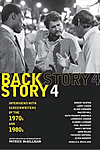Archive for the 'Screenwriting' Category
In the kitchen with Benton, Hill, Kasdan, et al.
DB here:
I’ve never understood why many people in film studies ignore what practicing filmmakers tell us about their work. If we want to know about technique, form, and the creative process, we should understand filmmakers’ craft knowledge, the tricks of their trade. Filmmakers know an awful lot, and we benefit from listening to them.
So books of interviews can be quite valuable. They take us into the kitchen and let us watch chefs at work. Sometimes they follow recipes but just as often they throw things together with inspired, or disastrous, results.

Among the best of the interview books is Pat McGilligan’s Backstory series, about screenwriters and their craft. Backstory 4, just out from the University of California Press, is an addictive read, and I recommend it. McGilligan has done a wonderful job assembling these interviews, most of which he also conducted. You can’t fail to learn about filmmaking, and along with that, the wit of people who use language for their living just cheers you up. A few samples out of many:
Walter Hill: “Shoot me as the Antichrist, but I never much liked the Beatles.”
Paul Mazursky: “Voice-overs are like a good drug.”
Donald Westlake: “People shouldn’t be handed a camera until they reach the age of reason.”
Alvin Sargent: “I hardly ever finish books. You know, Paper Moon is adapted from a book, and I truly didn’t read the last part of it. I just couldn’t read that book any more. I got bored.”
John Milius: “Our whole world, our whole culture, is like a giant high-school dance.”
Westlake again: “David Hockney is the only thing that’s ever been improved by being moved to Los Angeles.”
I’m especially glad that McGilligan included two of my favorite novelists. Elmore Leonard comes off as good-humoredly disillusioned with the screenwriting process. Just as important, there’s an enlightening interview with the prolific but still too little celebrated Donald E. Westlake. Westlake is known for his comic crime novels, but even better, methinks, is his hard-boiled fiction signed by Richard Stark. The Stark novels center on the professional thief Parker, and they’re unsentimental, stripped to the bone, and formally quite adventurous. One thing we learn from Backstory 4 is that one of the best Parker novels, The Jugger, was the putative source for Godard’s Made in USA. Westlake: “such a rotten movie.”













